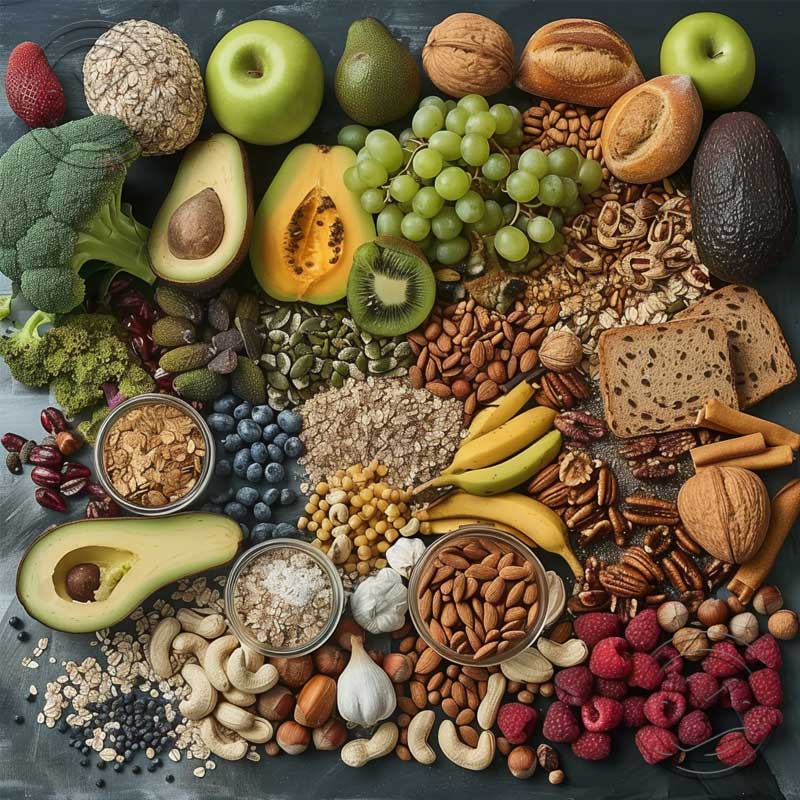What is a Vegan Diet?
Veganism is a type of diet that excludes all animal products, including meat, dairy, eggs, and honey.
There are many different reasons why people choose to adopt a vegan diet, including ethical concerns about the treatment of animals, environmental concerns about the impact of animal agriculture on the planet, and health concerns about the consumption of animal products.
Vegan diets can be healthy and nutritious, and there are a number of plant-based foods that can provide all the nutrients that the human body needs.
However, it is important to make sure that you are getting enough of all the essential nutrients, such as protein, iron, vitamin B12, and zinc.
There are a number of different types of vegan diets, including:
- Strict veganism: This is the most common type of veganism, and it excludes all animal products, including meat, dairy, eggs, and honey.
- Flexitarian veganism: This type of veganism allows for the occasional consumption of animal products, such as meat or fish.
- Lacto-ovo vegetarianism: This type of vegetarianism excludes meat and fish, but it allows for the consumption of dairy and eggs.
- Veganism for environmental reasons: This type of veganism is motivated by concerns about the environmental impact of animal agriculture.
- Veganism for ethical reasons: This type of veganism is motivated by concerns about the treatment of animals.
- Veganism for health reasons: This type of veganism is motivated by concerns about the health effects of consuming animal products.
If you are considering adopting a vegan diet, it is important to do your research and make sure that you are making the right choice for you.
There are a number of resources available to help you get started, including books, websites, and blogs.
History of Veganism
Veganism is a relatively new term, but the concept of abstaining from eating animal products has been around for centuries.
The earliest known vegans were the Pythagoreans, a Greek philosophical school founded in the 6th century BCE.
Pythagoreans believed that eating animals was wrong, and they advocated for a diet based on plants.
In the 19th century, the term vegan was coined by a British animal rights activist named Donald Watson.
Watson founded the Vegan Society in 1944, and he helped to popularize the concept of veganism around the world.
Today, veganism is a growing movement.
There are now millions of vegans around the world, and the number is steadily increasing.
The reasons why people choose to become vegan vary.
Some people become vegan for ethical reasons, while others do so for health reasons or environmental reasons.
Discover the savory revolution that's changing the way we think about cheese! In a world dominated by the dairy industry,…
Benefits
A vegan diet can have many benefits for your health, the environment, and animals.
- Improved health: A vegan diet is rich in fruits, vegetables, and whole grains, which are all good for your health. Vegans tend to have lower rates of heart disease, obesity, and certain types of cancer.
- Environmental sustainability: A vegan diet is much more sustainable than a meat-based diet. Animal agriculture is a major contributor to greenhouse gas emissions, water pollution, and deforestation.
- Animal welfare: A vegan diet avoids the unnecessary suffering of animals. Animals raised for food are often subjected to cruel and inhumane treatment.
Of course, there are also some potential drawbacks to a vegan diet.
For example, vegans may need to take supplements to ensure that they are getting enough nutrients, such as vitamin B12 and iron.
Additionally, vegan diets can be more expensive than meat-based diets.
Ultimately, the decision of whether or not to adopt a vegan diet is a personal one.
There are many benefits to a vegan diet, but there are also some potential drawbacks.
If you are considering a vegan diet, it is important to do your research and make sure that it is the right choice for you.
Drawbacks
There are a number of potential drawbacks to a vegan diet, including:
- The difficulty of finding vegan-friendly foods
- The potential for nutritional deficiencies
- The social and psychological challenges of being a vegan
Let’s take a closer look at each of these drawbacks.
Vegan Meal Plan For Muscle Gain
Discover the secret to building muscle as a vegan with our comprehensive guide. Debunk the myth that animal protein is…
The Difficulty of Finding Vegan-Friendly Foods
One of the biggest challenges of following a vegan diet is finding vegan-friendly foods.
This can be especially difficult in areas where there are few vegan restaurants or grocery stores.
Even in areas with a large vegan population, it can be difficult to find vegan versions of certain foods, such as cheese, meat, and eggs.
For example, if you’re a vegan who loves pizza, you may have to make your own pizza from scratch or find a vegan pizza restaurant.
If you’re a vegan who loves ice cream, you may have to find a vegan ice cream shop or make your own vegan ice cream at home.
The difficulty of finding vegan-friendly foods can make it difficult to maintain a vegan diet, especially if you’re new to veganism.
The Potential for Nutritional Deficiencies
A vegan diet can be healthy, but it’s important to make sure that you’re getting all of the nutrients that you need.
Some nutrients that vegans are at risk of being deficient in include vitamin B12, iron, and zinc.
It’s important to eat a variety of plant-based foods to ensure that you’re getting all of the nutrients that you need.
Some good sources of vitamin B12 include fortified cereals, nutritional yeast, and vegan supplements.
Good sources of iron include beans, lentils, tofu, and spinach.
Good sources of zinc include nuts, seeds, and whole grains.
If you’re concerned about getting enough nutrients on a vegan diet, talk to your doctor or a registered dietitian.
Discover the savory revolution that's changing the way we think about cheese! In a world dominated by the dairy industry,…
The Social and Psychological Challenges of Being a Vegan
Being a vegan can sometimes be challenging from a social and psychological perspective.
You may face criticism from friends, family, and coworkers for your dietary choices.
You may also have to deal with the inconvenience of not being able to eat at certain restaurants or events.
It’s important to remember that you’re not alone.
There are many other vegans out there who understand what you’re going through.
There are also a number of resources available to help you deal with the social and psychological challenges of being a vegan.
If you’re thinking about becoming a vegan, it’s important to be aware of the potential drawbacks.
However, it’s also important to remember that a vegan diet can be healthy and satisfying.
If you’re willing to put in the effort, a vegan diet can be a great way to improve your health and the environment.
Environment
Veganism has a number of positive effects on the environment.
Reduced greenhouse gas emissions
Animal agriculture is a major contributor to greenhouse gas emissions, which are a leading cause of climate change.
Livestock production generates methane, a potent greenhouse gas with a global warming potential 25 times greater than carbon dioxide.
In addition, deforestation for grazing land and the production of feed for livestock also contribute to greenhouse gas emissions.
Less water consumption
Animal agriculture requires a lot of water, both for drinking and for irrigating crops that are grown to feed livestock.
A 2018 study by the University of Oxford found that a vegan diet requires 99% less water than a meat-based diet.
Reduced land use
Animal agriculture is a major land user, taking up around 80% of agricultural land worldwide.
A vegan diet requires much less land, which can help to preserve forests and other natural habitats.
More sustainable food production
Veganism is a more sustainable way to produce food, as it does not require the use of animals or the destruction of natural habitats.
Vegan diets can also help to reduce food waste, as plant-based foods are more likely to be eaten than animal products.
In addition to these environmental benefits, veganism can also help to protect wildlife.
Animal agriculture is a major cause of deforestation, which destroys the habitats of many animals.
By choosing to eat a plant-based diet, you can help to protect wildlife and ensure that future generations can enjoy the benefits of a healthy planet.
Veganism and Animals
Veganism is a philosophy that seeks to exclude all forms of animal exploitation and cruelty, including the use of animals for food, clothing, entertainment, and research.
There are many ethical arguments for veganism.
Some vegans believe that it is wrong to kill animals for food when we have other options available to us.
Others believe that it is wrong to treat animals as property and to use them for our own purposes.
There are also many environmental arguments for veganism.
Animal agriculture is a major contributor to climate change, water pollution, and deforestation.
It also consumes a large amount of resources, such as land, water, and energy.
Veganism can also help to improve the lives of animals.
By choosing not to eat meat, dairy, or eggs, you are helping to reduce the demand for these products and thereby decreasing the number of animals that are raised and killed for food.
Of course, there are also some arguments against veganism.
Some people believe that it is natural for humans to eat meat and that veganism is unhealthy.
Others believe that it is too difficult to give up animal products.
Ultimately, the decision of whether or not to adopt a vegan lifestyle is a personal one.
Veganism and Health
There is a growing body of evidence that a vegan diet can be beneficial for your health.
Studies have shown that vegans have a lower risk of heart disease, cancer, and obesity than meat-eaters.
- A vegan diet is high in fiber, which can help to lower cholesterol and improve digestive health.
- Vegans tend to eat more fruits, vegetables, and whole grains, which are all good sources of vitamins, minerals, and antioxidants.
- A vegan diet is also low in saturated fat and cholesterol, which are two risk factors for heart disease.
- Studies have shown that vegans have a lower risk of developing certain types of cancer, such as colon cancer and prostate cancer.
- Vegans tend to be thinner than meat-eaters, and they have a lower risk of obesity and its associated health problems, such as heart disease, stroke, and type 2 diabetes.
Of course, a vegan diet is not without its challenges.
It can be difficult to find vegan-friendly options when eating out, and it can be more expensive to buy vegan food than meat-based food.
However, the potential health benefits of a vegan diet make it a worthwhile option for many people.
Veganism and Religion
Veganism intersects with religion in a number of ways.
Some religions have specific dietary restrictions that overlap with veganism, while others have more general principles that can be interpreted in a vegan way.
Some religions have specific dietary restrictions that overlap with veganism.
For example, Hinduism, Buddhism, and Jainism all prohibit the consumption of meat, fish, and eggs.
Other religions have more general principles that can be interpreted in a vegan way.
For example, the Christian Bible teaches that humans should be stewards of the Earth and care for all of its creatures.
Some vegans believe that their diet is a way to live in accordance with their religious beliefs.
They may see it as a way to show compassion for animals, to protect the environment, or to live more simply.
Other vegans do not see their diet as being directly related to their religion.
They may be vegan for ethical, environmental, or health reasons, regardless of their religious beliefs.
It is important to note that there is no one right way to be vegan.
Whether or not you choose to incorporate your religious beliefs into your veganism is a personal decision.
Veganism and Culture
Veganism is a way of living that seeks to exclude all forms of animal exploitation and cruelty, including the consumption of meat, dairy, eggs, and honey.
It is a philosophy and lifestyle that is based on the belief that humans have no right to use animals for food, clothing, or any other purpose.
Veganism is a relatively new movement, but it is growing rapidly in popularity.
There are now millions of vegans around the world, and the number is increasing every day.
There are many different reasons why people choose to adopt a vegan lifestyle.
Some people do it for ethical reasons, while others do it for environmental reasons, or for health reasons.
Whatever the reason, there is no doubt that veganism is a growing trend.
And as it grows, it is becoming increasingly important to understand how veganism is expressed in different cultures.
In this section, we will discuss the different ways that veganism is expressed in different cultures.
We will also explore the benefits of veganism for both individuals and society as a whole.
Veganism in Western Culture
Veganism is a relatively new movement in Western culture.
It began in the early 20th century, and it has been growing in popularity ever since.
There are a number of reasons why veganism is becoming more popular in Western culture.
One reason is the growing awareness of the ethical issues surrounding animal agriculture.
Another reason is the increasing concerns about the environmental impact of animal agriculture.
Finally, there is also a growing interest in the health benefits of a vegan diet.
Veganism in Eastern Culture
Veganism is not a new concept in Eastern culture.
In fact, there are many historical examples of people who have lived vegan lifestyles.
For example, the Buddhist monk Bodhidharma is said to have lived a vegan lifestyle for many years.
In recent years, veganism has become increasingly popular in Eastern culture.
This is due to a number of factors, including the growing awareness of the ethical issues surrounding animal agriculture, the increasing concerns about the environmental impact of animal agriculture, and the growing interest in the health benefits of a vegan diet.
Becoming a Vegan
If you’re thinking about becoming a vegan, there are a few things you should know.
First, it’s important to make sure that you’re doing it for the right reasons.
Veganism is a lifestyle choice that’s based on ethics, the environment, and/or health.
If you’re not motivated by these reasons, you’re likely to have a difficult time sticking with it.
Second, you need to be prepared for the challenges.
There will be times when you’re tempted to eat or use animal products.
It’s important to have a strong support system in place to help you stay on track.
Third, you need to do your research.
There are a lot of resources available to help you learn about veganism.
Make sure you’re informed about the benefits and drawbacks of a vegan diet before you make the switch.
If you’re ready to take the plunge, here are a few tips to help you transition to a vegan lifestyle:
- Start by gradually cutting out animal products from your diet. This will give your body time to adjust to the changes.
- Find vegan-friendly recipes that you enjoy. There are many delicious vegan dishes out there, so you won’t have to miss out on anything.
- Make sure you’re getting enough nutrients. A vegan diet can be healthy and nutritious, but it’s important to make sure you’re getting all the nutrients you need.
- Don’t be afraid to ask for help. There are many resources available to help you on your vegan journey.
Becoming a vegan is a big decision, but it’s one that can have a positive impact on your health, the environment, and the animals.
If you’re thinking about making the switch, do your research and make sure you’re ready for the challenges.
With a little planning and support, you can successfully transition to a vegan lifestyle.






